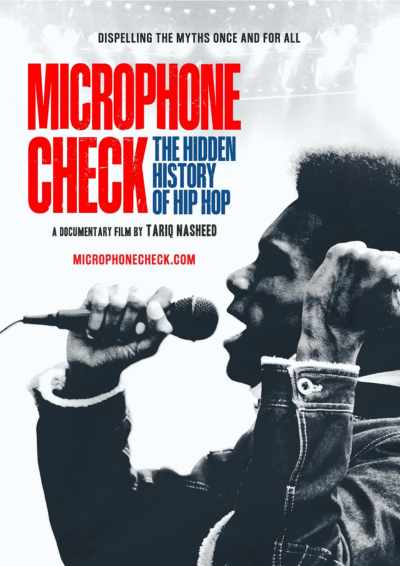Tariq Nasheed, director of Microphone Check, a documentary about Hip-hop (Credit: Kickstarter).
By Corli Jay
With her most recent album “Cowboy Carter,” Beyonce has sparked conversations about the Black origins of country music, a genre long co-opted and gentrified by the White masses despite its roots as a Black-founded style of music.
A new documentary similarly aims to dispel myths about the origins of one of the world’s most popular musical genres, Hip-hop.
“A lot of false claims, a lot of myths, a lot of misconceptions have been thrown out there about Hip-hop, the origin of it [and] where it came from,” said Tariq Nasheed, the director of the documentary “Microphone Check: The Hidden History of Hip Hop.”
He adds that myths of the genre’s origins often include that it derived from “African rhythms, Caribbean rhythms and Latino rhythms, excluding the foundational Black Americans here who created the culture.”
Nasheed says he felt pushed to work on the documentary amid the 50th anniversary of Hip-hop and the fallacies of conversations about the genre’s roots.
The film hosted its Chicago premiere on May 23 at Landmark’s Century Centre Cinema, where an audience packed the theater to learn more about misconceptions about the origins of Hip-hop. They were also looking for the film to set the record straight.

According to the Encyclopedia Britannica, Hip-hop originated in the New York City neighborhood of the South Bronx in the late 1970s. Nasheed said the film will help dismantle the creation of new narratives that can often rewrite history if left unchecked.
“We’re reclaiming a lot of things that we created that we’ve been taken out of, rock n’ roll the same thing. Whenever we do rock, now, we’re looking at his outsiders. So it was very important for us to establish and let people know where these genres came from.”
The film centers Black Americans as the creators of a genre that many have found comfort in since its growth from a rebellious form of artistry to a commercialized business.
“Microphone Check” explores four elements of Hip-hop: rapping, breakdancing, graffiti and DJ-ing while paying homage to overlooked pioneers such as Coke La Rock, Trixie, A1 B-boy Sasa, Sha Rock, Melle Mel and Grandmaster Caz.
“Microphone Check” digs into the roots of the genre, as the story of how Hip-hop got its start is associated with a 1973 party. The tale goes that a young woman named Cindy Campbell put out flyers for a party to raise money for clothes, which was deejayed by her brother Kool Herc, solidifying history.
However, hip-hop historian JayQuan poses the question, “What happened before the party?”
The documentary chronicles the Black experience and how it contributed to the creation of a musical art form, from slavery to Jim Crow and the Great Migration from southern states such as Mississippi and Tennessee to cities like Detroit, New York and Chicago.
Dispelling tales that the art of rapping stemmed from Jamaican toasting, the film instead tells little-known stories of Black comedians such as Pigmeat Markham from North Carolina, who often rhymed during his performances.
“Microphone Check” also explores how battle rap arose from “playing the dozens,” a game where Blacks poked fun at each other to build tough skin. The documentary centers icons such as James Brown for laying the foundation of Hip-hop not only through soul music but also for his dancing style, which was the predecessor to break dancing.
Perhaps the most polarizing aspect of the film occurs when the narrative that Hispanics were the co-creators of Hip-hop gets attacked. Sha Rock, a former member of the group Funky Four Plus One who is credited as the first female emcee, described Latinos as “the first students of Hip-hop” who would eventually help push the genre forward and implement new styles established by Black youth. However, she and Nasheed contend that they were not pioneers or co-founders of the genre as they were popularly portrayed to be.
“I want people to really appreciate the truth and respect where the culture came from. Because I think it’s disrespectful when people come in the game and try to claim the things that we created,” said Nasheed.
As the film focuses on Hip-hop’s early days, this need to continuously speak on true origins can be seen in newer sub-genres of Hip-hop, such as the Chicago-founded drill music, which many have grown to associate with New York as it grew in the 2010s.
As the genre has grown from a demonized form of music to a billion-dollar empire, many have tried to embed themselves in the early days of the genre, according to the film.
“Microphone Check” celebrates the resiliency of Black folks through the lens of hip-hop’s creation.
The film highlights one of many ways Black Americans are pushed to the sidelines, as society typically tries to celebrate the inventions of a people it continues to undercut.